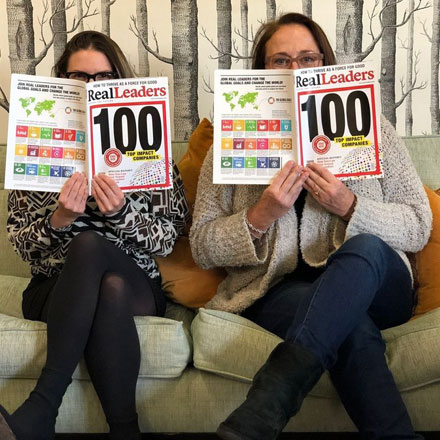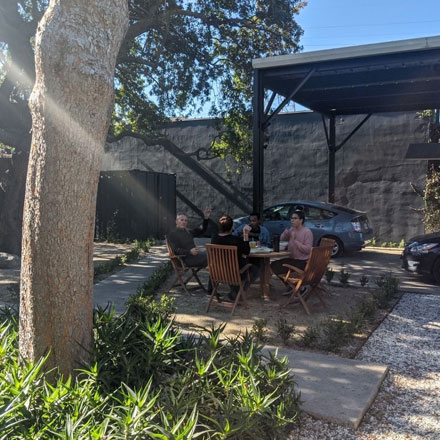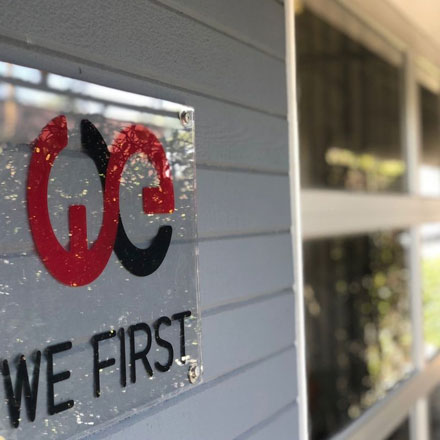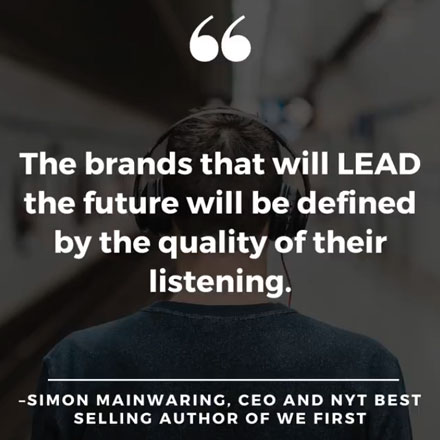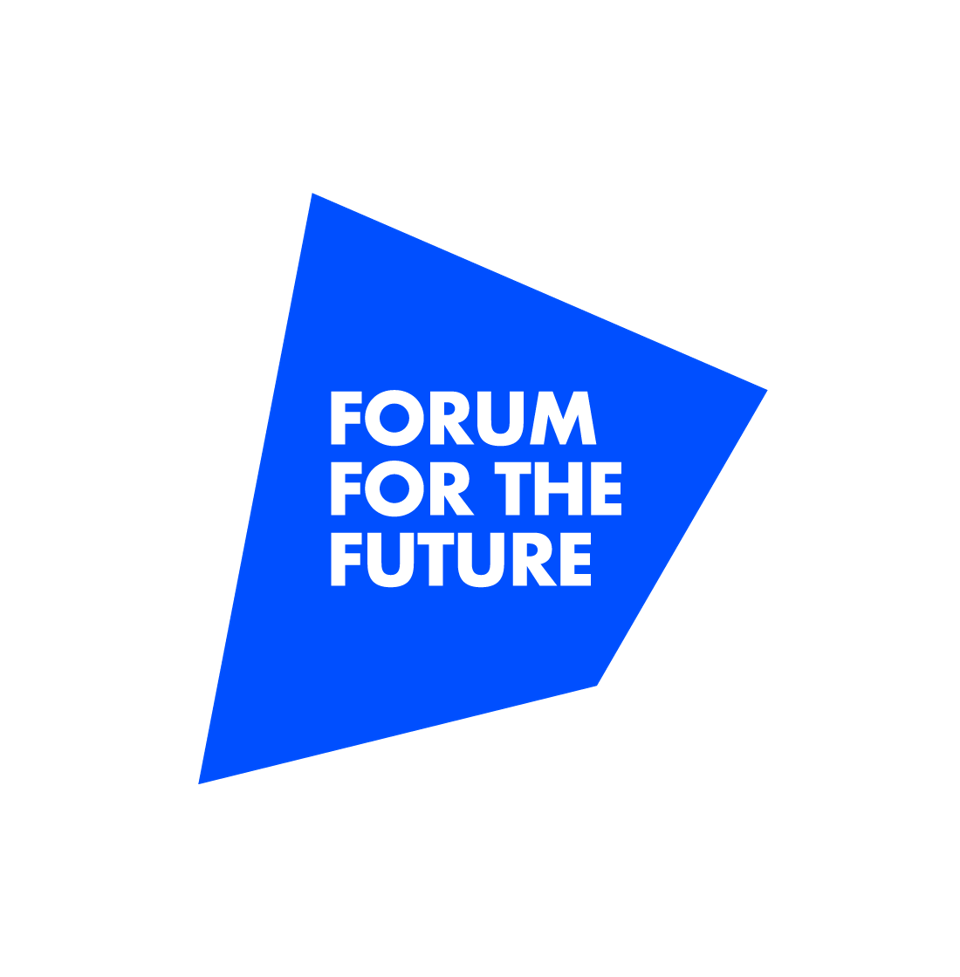
Purpose At Work
Purpose At Work: Forum For The Future CEO Sally Uren Talks Transformation

Collaborative leadership is essential to cultivating an abundant and flourishing world. Organizations that build community and cultural conversations around a higher purpose are rewarded with goodwill and loyalty. Forum For The Future is setting a prime example of how to bring partners from the business, government and nonprofit sectors together to create a meaningful shift towards a sustainable future.
“We bring brands together to focus on shared challenges,” Sally Uren, CEO of Forum For The Future, tells We First. “Competition law hasn’t caught up with the need for pre-competitive collaboration.” Issues like climate change, the novel coronavirus and poverty eradication need an all hands on deck approach. Uren’s experience and collaborative approach offer valuable lessons to impact-driven pioneers looking to Lead With We.
Backstory
Since her school days, Sally had a calling towards sustainability. She studied biology at the University of Manchester and completed a Ph.D. researching the effects of air pollution on semi natural ecosystems.
“I did a postdoctoral fellowship in the rainforest of Borneo. That cemented in me an understanding that we can reverse environmental damages,” Uren shares. ”I wanted to apply everything I’d learned through my research.”
At the onset of her career, Uren worked as an air quality and sustainability consultant for large infrastructure projects in the U.K. She found resistance when she would say things like, “I’m not sure that’s going to create the change that we need to see.” Although she received prison threats and heavy disdain, Sally didn’t stop. “The closer you get to shifting a system, the harder it pushes back at you.” She eventually joined the nonprofit sector, where she felt she could be more candid and have a larger impact.
As CEO of Forum For The Future, Uren works to “sketch out what a positive future is that allows people and the planet to thrive,” she says. “We then encourage business philanthropy, government, civil society, and whoever will listen to create the future we want. Our work is to equip people to drive big change and to go with them on that journey.”
What’s at stake
We’ve been hearing it for years, if we don’t drastically decarbonize the global economy, humanity is headed for irreversible climate change. Despite an increased basic understanding of the problem, “we have failed to deal with structural inequalities,” Uren says. “So, you’ve got a profound environmental challenge and a profound societal challenge coming to bear at the same time.” The good news is that if we work together to take action, our future doesn’t have to end in peril.
What’s possible
To showcase potential outcomes, Forum For The Future recently released The Future Of Sustainability report. The study outlines four potential trajectories for what the future might look like, depending on how we act as a global society over the next several years.
The first scenario is called Unsettled. In this scenario humanity bounces from one crisis to another, forced to continuously adapt and respond to uncertain challenges. “The institutions we’ve established to manage through the 21st century don’t work in that level of discontinuity and uncertainty,” Sally says. “Brands that can be flexible, adaptive and highly creative may be able to do well but they will be the minority. In that trajectory, we stand no chance of solving climate change or dealing with structural inequality.”
Fortunately, that is the most dark trajectory. The next scenario is titled Discipline. In this pathway, efficiency, government oversight and corporate control dominate reality. There’s little regard for privacy. Society is run by a command and control approach to confronting issues like Covid-19. The economy is able to recover to pre-pandemic status but it is largely focused on financial performance. “Features of sustainability, like the circular economy do really well because they are super efficient,” Uren explains. “We see rapid automation of global supply chains without a thought to social equity or social justice. Technology drives growth and democracy is not a priority.
While safe, the Discipline scenario limits freedom and individuality. The subsequent trajectory, known as Lively, is based on the “compete and retreat” mentality. Populist dynamics reign and every nation is for themselves. “This mimics what we are seeing with the U.S. pulling out to the World Health Organization and India limiting export of paracetamol to keep the stocks for their own population,” Uren says. “In this trajectory, international attempts to deal with climate or looking out for the poorest people don’t work. The mindset is, ‘My citizens and my nation come first.’”
None of these paths are optimal; however, if we take a collective approach to addressing economic, environmental and equitable well-being, there’s a chance that we can manifest a sustainable and abundant future.
Forum For The Future’s Transform trajectory is driven by the idea that “planetary health equals human health, which equals economic health,” Sally says. “We’ve seen this in Covid-19. If we’re sick, the economy is sick. If the planet is sick, we can’t see a functioning economy.” Transform highlights the need to rethink our global economy and develop beyond where we left off before Covid-19, to prioritize the environment and social justice as well as economic prosperity. “We see proof points that society is moving towards this Transform trajectory,” Uren says.
Changing the conversation
“If nature was a bank, it would have been bailed out a long time ago,” Uren says. If society is going to reach anything close to the Transform scenario, we’re going to have to change the language around success and development.
The good news is that it’s happening. “The amount of money flowing to ESG (environmental, social and governance) funds is multiplying,” Uren says. “The investment community is waking up to the value at risk posed by the climate emergency.”
The tricky thing is that all four scenarios could be unfolding simultaneously around the world, she explains. “The more you can take actions consistent with the future that you want, the greater the chance of that version of the future emerging. Self-fulfilling and self-defeating promises are real.”
Changing people’s ideology and business priorities is no easy task. “A lot of what we do is trying to persuade senior decision makers that the current economic construct is flawed. We try to persuade brands to embrace different metrics and routes to value creation,” Forum For The Future’s CEO says.
Actions we can take
We all have a role to play in cultivating the future we collectively need. Here are specific actions people and organizations across the spectrum can take to move the needle towards a prosperous, sustainable and equitable future.
Entrepreneurs: “Have a vision about what success looks like. Focus not only on financial metrics, but how you’re contributing to dealing with some of these big challenges?” Sally says. With renewable energy prices decreasing and sustainable supply chain options increasingly available, “It’s never been easier because protecting the environment can save us money,” she says.
Investors: Money talks. “Investors need to ensure that capital is flowing into the industries of the future, not the interests of yesterday,” Sally says. Divestment and ESG funds are indicators that the investment community is shifting.
Philanthropists: While charity is important, we need to practice conscious giving. “Philanthropy needs to stop investing billions in plaster solutions and putting all of their money on disaster relief,” Uren says. “It’s important but while that happens, we’re not injecting that risk tolerance into solving these big challenges. Philanthropic organizations need to take a deep look at the root cause of the problem they’re trying to solve.”
Employees: If the company’s purpose is unclear, ask leadership to clarify it. In addition to discussing purpose with your brand, Uren recommends discussing how your pension fund is being managed. “Are your fund managers investing in fossil fuel industries?” Sally says. By requesting transparency from your employer you can help move the needle. “The return you’ll get from a pension fund that’s invested into renewable and low carbon technology will do better in the future. That’s the pathway to value creation over the next decade,” she says.
Consumers: As a consumer you can ask questions like, “Do they have science-based climate targets? Where and how are these products made?” Sally suggests. With certification programs and industry watchdogs on the rise, more and more brands are getting certifications. While not perfect, these certifications can be a great tool to assess a company’s stance in regards to things like fair trade, organic and other environmental indicators.
Policymakers: “We need governments to create policies and frameworks that enable the transition to a fair and carbon-free society,” Uren says. The Biden Administration’s re-entry into the Paris Climate Agreement and enabling policy frameworks will hopefully lay the infrastructure for sustainable growth.
Civil society: “Civil society needs to be more active in saying, ‘This isn’t good enough,’” Uren suggests. “They need to rally businesses, governments and others to do more.”
Purposeful collaborations
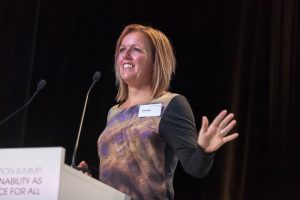
It is the combined input of all stakeholders that will bring forth the future we want to see. Brands must collaborate with suppliers and each other to weave sustainability throughout the value chain.
“Many large companies are dependent on global supply chains they don’t have full control over,” Uren says. “Brands across sectors share these supply chains and they’re all at risk at the moment. In order to ensure resilience and access to supply, you need to collaborate. If you want to ensure continued access to secure supply, you’re often going to have to work with your competitors”
Not all competitors want to make the investment in sustainability innovation. “You need one or two to come with you.” Uren says. “Change happens because there are pioneers willing to push the boundary.”
Some excellent examples of brands leading the way when it comes to collaboration around sustainability are Interface, Patagonia, Unilever and Amazon. “Interface launched a carbon negative carpet, sequestering carbon out of the atmosphere with each tile made. I love what Patagonia is doing in terms of its partnerships with smallholder cotton farmers, enabling them to convert from conventional to organic cotton production in a way that they don’t lose money,” Uren says. “Unilever launched a $1 billion Euro nature and environment fund just to decarbonize supply chains. Amazon’s got a $2 billion climate pledge.” Increased funds and momentum towards regenerative systems are building momentum with companies both large and small.
Is it enough
Despite global momentum from businesses and initiatives like the Sustainable Development goals, we aren’t seeing the progress we need to limit irreversible environmental impacts. “We need to reconfigure the goals of the system we rely on,” Uren says. “Take our food system for example. It’s working well to the current goals of supplying cheap food delivered in large volumes in a way that doesn’t look out for farmer livelihoods or long term environmental health. We need to restate the goal of the food system from extracting value to creating value.”
Transformation requires dedication and the willingness to break patterns. “We haven’t made enough progress. We’ve focused more on incremental change because it’s easier. We’ve been locking in existing unsustainable practices and we’ve lacked imagination required to step into that future in the way that we should,” Uren says.
Lessons from Sally Uren on how to Lead With We
- “Appealing to consumers as individuals and appealing to values is something that every brand can do more. Design your communication at a human level.”
- “Shift your internal dialogue from ‘Whatever I do won’t make a difference,’ to ‘I have extraordinary power and agency as an individual. Optimism does create change.”
- “Have a vision of what it is you’re trying to do. Don’t beat yourself up if you don’t know how to get there. If in your efforts to change things, people end up shouting at you and you’re experiencing negative energy, bank it. It means you’re actually close to doing something special. Don’t be disheartened by it, dust yourself off and keep going.”
- “Hold onto the potential, not the uncertainty.”


